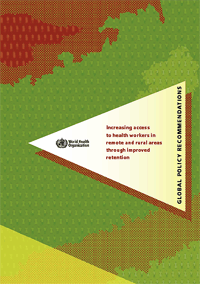 | Number of pages: 79 Publication date: July 2010 Languages: English ISSN: 9789241564014 Download at: http://www.who.int/hrh/retention/guidelines/en/index.html |
The recently launched World Health Organization (WHO) guidelines Increasing access to health workers in remote and rural areas through improved retention is the product of the contribution and collaboration of approximately 70 rural health leaders from all world regions.
The guidelines are 16 evidence-based global policy recommendations on how to improve the recruitment and retention of health workers in underserved areas, arising from the WHO program Increasing access to health workers in remote and rural areas through improved retention. For example:
Regulatory recommendation: Introduce and regulate enhanced scopes of practice in rural and remote areas to increase the potential for job satisfaction.
Financial incentives recommendation: Use a combination of fiscally sustainable financial incentives, such hardship allowances, grants for housing, free transportation, paid vacations, etc., sufficient enough to outweigh the opportunity costs associated with working in rural areas, as perceived by health workers, to improve rural retention.
The recommendations are drawn from the strongest evidence available (generally Australian, Canadian and USA studies); however, what has been produced is a practical and comprehensive tool that will be useful in all countries. The Guidelines complement the WHO Code of Practice on the International Recruitment of Health Personnel, adopted by the 63rd World Health Assembly in May 2010.
The book first provides the setting and describes the methodology used, and follows with an outline of guiding principles for the formulation of national policies. The expert group's evidence-based recommendations for recruitment and retention at the level of education and regulatory interventions are provided, as well as suggested incentives and support. Relevance, acceptability, affordability, effectiveness and impact are acknowledged as important measures for implementation and evaluation of rural retention policies. It also offers a guide for policy-makers regarding the most appropriate interventions, and how to implement, monitor and evaluate their impact over time.
The main system used for assessing evidence for interventions was the GRADE (Grading of Recommendations, Assessment, Development and Evaluation) methodology. Other criteria include balancing benefits and risks, values and preferences, and assessing resource use. Detailed descriptive evidence tables are included in annex, providing evidence additional to the GRADE profiles.
The document identifies research and evidence gaps, which suggest a future research agenda to accompany further country case studies in a planned revision in 2013. The impression is that input from a more diverse group of countries and cultures will enrich the recommendations in subsequent editions. For instance, the 'cultural flavour' of healthcare provision may be most distinctive in rural areas, and we look forward to WHO and its group of experts exploring this in the future.
The Guidelines are a component of WHO's efforts to reach the Millennium Development Goals - in particular related to the strengthening of health systems with the aim of universal coverage by primary care, currently a global shortage area for rural and remote health services. As WHO's Director-General Dr Margaret Chan states, this publication will become a useful tool that provides countries, policy-makers and health systems with the instruments necessary to improve workforce distribution and enhance rural health services.
The importance of these landmark guidleines is emphasised in an associated Rural and Remote Health Editorial1
Jose M Lopez-Abuin, MD
Instituto De Salud Rural [Spanish Rural Health Institute]
La Corunna, Spain
Reference
1. Rourke J. WHO Recommendations to improve retention of rural and remote health workers - important for all countries. Rural and Remote Health 10(4): 1654. (Online) 2010. Available: www.rrh.org.au (Accessed 24 November 2010).
